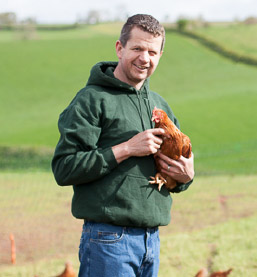If things are this good why grow wings, why even move? Why have sex and risk producing variable babies that may not be as good as me? Sexual reproduction is so full of uncertainty. Why not just stay put, plug in, suck that sweet, sweet sap and pour out a stream of babies identical to me through parthenogenesis; they need only shake free of my abdomen, plug in and enjoy the same good life. Within five days the young’uns will be squeezing out their own; it’s perfect.
Two weeks ago, looking around the peppers on our farm in France I calculated that about 20 million wingless aphids were sucking the life out of my crop; each leaf had up to ten mothers with a stream of look-a-likes plugging in within millimetres of their mother. Marco, my ever-calm agronomist, told me not to worry; “I’m on top of it,” he said. The temptation for the macho and inexperienced would be to wade in with some soap spray (restricted but permissible under organic regulations) which effectively suffocates the aphids it touches by invading their spiracles, but this would also risk killing the predators already feasting on the aphids and destroy our chances of reaching the holy grail of organic pest control; balance. Marco’s policy was to wash off the worst colonies with water and introduce more ladybirds to mop up the rest. I was nervous; a ladybird can eat 5000 aphids in its life but can’t compete with their reproduction rate. Who would eat their way to the top? As well as ladybirds we often seek help from my favourite aphid predator, Aphidius colemani. This tiny parasitic wasp oviposits a single egg in each aphid which slowly digests them from within before emerging two weeks later, alien style, as an adult wasp ready to lay another 200 eggs; we introduced some of them for good measure.
Two weeks later, Marco was proved right; the ladybirds won and it looks like we will have a good, if slightly delayed, crop of peppers. Having seen the scenario played out so many times since we gave up spraying soap on aphids 15 years ago, I should have had more faith in the under-promoted virtue of using less and understanding more. If a fraction of the money spent on pesticides and GM went into studying agro-ecology, most insecticide use could be avoided.
Guy Watson





In a similar manner we use parasitic wasps to munch up fly eggs before they hatch, much better than a dodgy chemical!
Thanks for the info about the soap. I never knew it was damaging. So, how do I invite more ladybirds into our allotment and house garden?
Yes where do you get more lady birds, of course at the ladybird shop!!